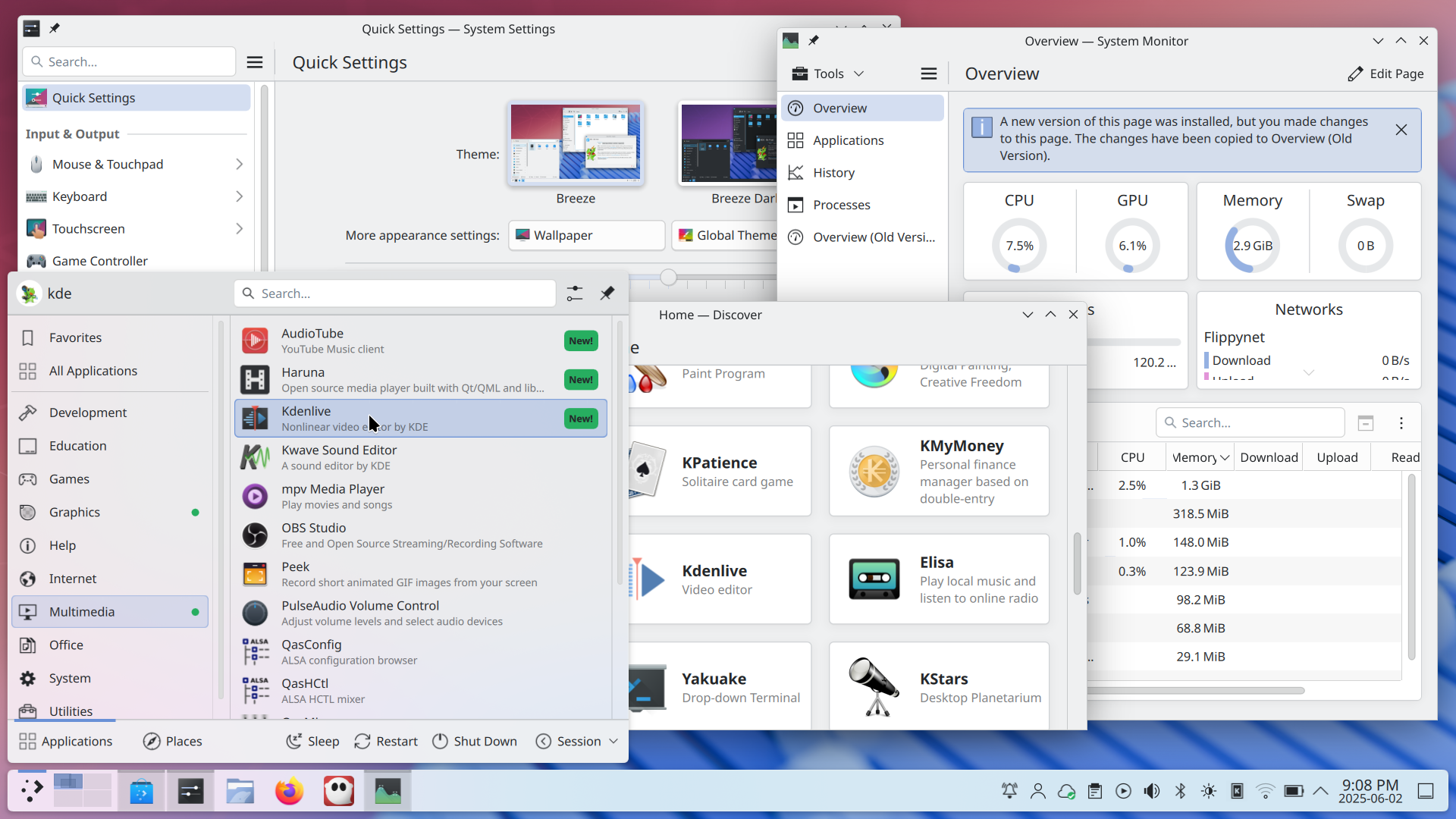Massive thanks to Microsoft for forcing my hand into replacing windows 10 with Linux.... installed mint a couple of days ago completely erasing all trace of Windows... wish I'd done it years ago. All the games I play on Steam work perfectly (aside from vulcan shader annoyances), general PC feels snappier than ever and I dont have some bullsheet AI nonsense rammed down my throat. Good riddance MS!
You are using an out of date browser. It may not display this or other websites correctly.
You should upgrade or use an alternative browser.
You should upgrade or use an alternative browser.
#Random Linux
- Thread starter Ice Tea
- Start date
More options
Thread starter's postsAssociate
- Joined
- 9 Jun 2004
- Posts
- 1,543
Welcome to the bright side!
Another amazing wallpaper plus other new features. Man I love KDE.


Soldato
- Joined
- 16 Jan 2005
- Posts
- 2,550
- Location
- Wales
Looking forward to trying this, bit nervous though as every major KDE release has broken bits for me previously.Another amazing wallpaper plus other new features. Man I love KDE.

I do have a lot of love for Alpine Linux, i wish i could run it as a daily driver.
Sounds interesting. I've never used Alpine Linux. I might spin up a virtual machine to test it.
I do have a lot of love for Alpine Linux, i wish i could run it as a daily driver.
Tiny and fast if you have Intel or AMD graphics, but the deal-breaker for me at the moment is that there are no musl Nvidia drivers, only nouveau.
If you need the glibc version of applications, you can get around musl by installing Flatpaks, but then things can start to get bloated.
If you need the glibc version of applications, you can get around musl by installing Flatpaks, but then things can start to get bloated.
Last edited:
Ah, I'm on Apple Silicon. Will be interesting to see what the support is like.Tiny and fast if you have Intel or AMD graphics but the deal breaker for me at the moment is there are no musl Nvidia drivers, only nouveau.
If you need the glibc version of applications you can get around musl by installing flatpaks but then things can start to get bloated.
Ah, I'm on Apple Silicon. Will be interesting to see what the support is like.

How to Install Alpine Linux and Set up a Desktop Environment
Ready for a lightweight and customizable Linux experience? Dive into our guide on installing Alpine Linux and setting up a desktop environment.
Last edited:
It's an Intel MacBook unfortunately. It's just the supporting silicon that is a problem which makes it even more annoying.
Associate
- Joined
- 19 Dec 2009
- Posts
- 1,799
Which distro are you trying? I'm very surprised your macbook isn't supported.My MacBook seems to be the only one that there are issues installing Linux on! The WiFi chip doesn't have support and I can't see broadcom putting the resources into it for such a small userbase.
It's not a distro issue as much as it's kernel/driver/hardware support issue.Which distro are you trying? I'm very surprised your macbook isn't supported.
The macbook in question is a Macbook Pro 2016 with Touch bar aka "macbookpro 13,3". The main issues are bad to almost non functional wifi, audio input/output regressions on newer kernels, dodgy suspend/hibernate and there's more smaller stuff too. The wifi is the biggest issue as it's not fixable without the wifi chip designer's support, which is not forthcoming. Without proper wifi the laptop becomes a bit redundant as a portable device. Even then, other fixes need to be patched into the kernel and I don't want to be patching a bunch of things that will inevitably break when there's updates as has happend in the past.
https://github.com/Dunedan/mbp-2016-linux gives a bit of an overview but there's more out info there. Support has acutally got worse over time rather than beter!
I've used opencore and installed Ventura which has breathed a bit of life into it. However, as another kick in the side, anything newer than Ventura has really bad battery life! It's a shame because it's a really good laptop that has been reduced to chromebook levels of functionality by lack of support.
Last edited:
Associate
- Joined
- 19 Dec 2009
- Posts
- 1,799
Yeah of course, and the kernel version is typically tied to what distro you're using no? I guess I naively assumed that by now, a more recent kernel would support a 2016 Macbook but I guess I was wrong.It's not a distro issue as much as it's kernel/driver/hardware support issue.
Shame your macbook is on the verge of being relegated to e-waste though.
Yeah of course, and the kernel version is typically tied to what distro you're using no? I guess I naively assumed that by now, a more recent kernel would support a 2016 Macbook but I guess I was wrong.
2016 was when Apple really started baking in their custom stuff - and the Linux support went downhill until all the focus has been on Apple Sillicon now. Apple is too much of a closed ecosystem, zero data sheets available for their hardware to work with. <2016 support was alright - >2016 is shocking until Asahi came about for ARM.
Going from a Surface Laptop and Windows PC......for the last month or so I've been switching between a Mac Air, and Linux desktop.
Have to say I find the sheer volume of updates on Linux a pain in the arse. Windows Update doesn't seem so bad in comparison.
I like how snappy the linux desktop is, and KDE is nice. But I think I will end up replacing the desktop with a Mac.
Have to say I find the sheer volume of updates on Linux a pain in the arse. Windows Update doesn't seem so bad in comparison.
I like how snappy the linux desktop is, and KDE is nice. But I think I will end up replacing the desktop with a Mac.
Associate
- Joined
- 9 Jun 2004
- Posts
- 1,543
How anyone can come from Windows to Linux and say that the updates are a pain is beyond me.
At least with Linux you have full control over what and when you update. Also Linux very rarely needs to reboot following an update.
At least with Linux you have full control over what and when you update. Also Linux very rarely needs to reboot following an update.
I've never had a problem with choosing when and what Windows Updates happen, not rocket science.How anyone can come from Windows to Linux and say that the updates are a pain is beyond me.
At least with Linux you have full control over what and when you update.
KDE Neon has updates that want a reboot literally every day. Sure I can just update when I want to (same as windows), but it objectively is not any less faff than Windows, at least that only want a reboot every week or so.Also Linux very rarely needs to reboot following an update.
Associate
- Joined
- 9 Jun 2004
- Posts
- 1,543
Not rocket science on the face of it, no. But the number of complaints about (and my experiences of) Windows update would suggest otherwise.I've never had a problem with choosing when and what Windows Updates happen, not rocket science.
KDE Neon has updates that want a reboot literally every day. Sure I can just update when I want to (same as windows), but it objectively is not any less faff than Windows, at least that only want a reboot every week or so.
KDE Neon is not a typical Linux distribution and it's not surprising that it gets more frequent updates. The developers themselves admit that "There is no thorough review of the complete software stack to guarantee a rock solid day-to-day experience." so what you are seeing is not the typical Linux update experience.
I run KDE Plasma on my desktop which I use for at least 8 hours every day and very rarely experience any updates that require a reboot.



